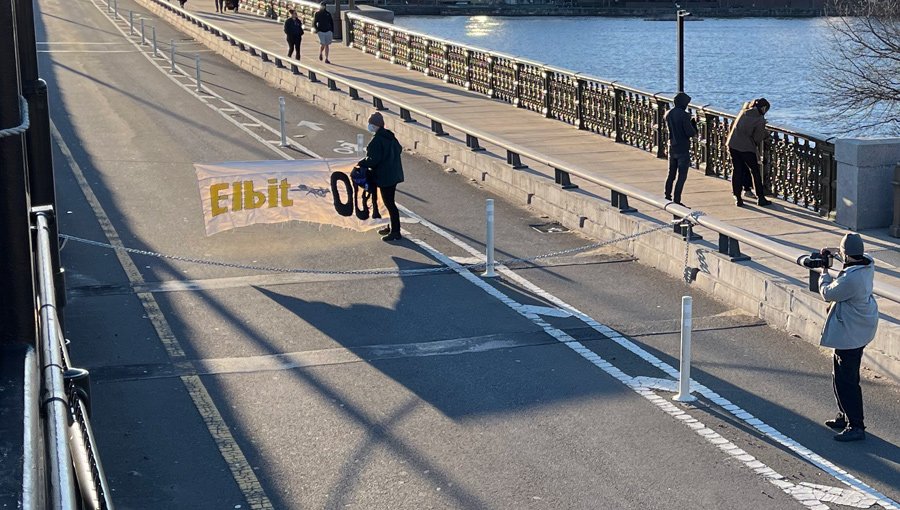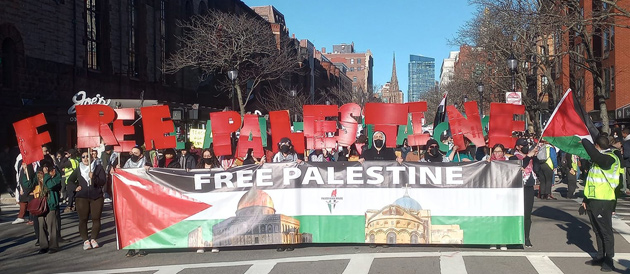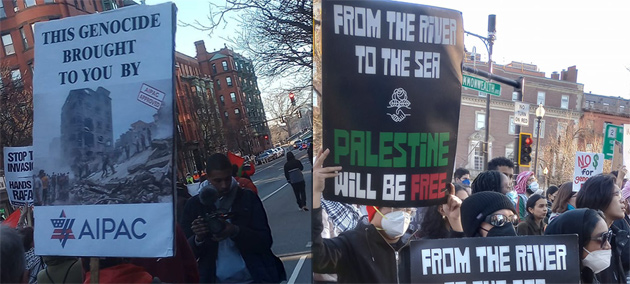
A UHub correspondent reports he was on the outbound Red Line platform at Charles/MGH around 6:15 p.m:
I looked down onto the 1-lane roadway and saw protestors whom I think had abandoned a vehicle in the Cambridge-bound lane (to block traffic behind them -- it's a single-lane road) and then pulled this big chain across the roadway to further prevent access. "Elbit Out" is the sign by the chain.
Elbit is an Israeli defense contractor with an office in Central Square.
Ron Newman reports he was on Newbury Street around 5 p.m., when marchers walked by on their way to Mass. Ave. and the Mass. Ave. Bridge:


Like the job UHub is doing? Consider a contribution. Thanks!
Ad:
Comments
Hamas seeks the eradication
By Don't Panic
Sun, 03/31/2024 - 12:24am
Hamas seeks the eradication of Israel in order to Free Palestine. Israel is an ally of the United States. If these protestors wish to Free Palestine all they have to do is vote Republican come November. Their guy could not bother to care what happens to Israel unless they pay. Sad but true.
yeah, no
By berkleealum
Sun, 03/31/2024 - 6:12am
Trump is capricious at times, but you can always bet on his return to Republican orthodoxy
"Trump is capricious at times"
By CopleyScott17
Sun, 03/31/2024 - 8:37am
Must be an early April Fool's joke?
i was referring to policy
By berkleealum
Sun, 03/31/2024 - 3:32pm
e.g. his short lived campaign for $2000 COVID stimulus checks.
my point being there’s zero chance he takes anything but a pro-Israel stance if he reaches office
I posted some more photos on Facebook, with videos too
By Ron Newman
Sun, 03/31/2024 - 12:36am
Newbury Street, 5-5:15 pm
Mass. Ave. in Back Bay, 5:55-6 pm, includes several videos with chanting. Are they yelling "We don't want no two states" or "We don't want no Jewish state"?
I heard "We don't want no
By Don't Panic
Sun, 03/31/2024 - 12:57am
I heard "We don't want no Jews state. We want 48!".
The protest was at the Copley
By redheadedjen
Sun, 03/31/2024 - 5:58pm
The protest was at the Copley library around 4 yesterday. It was peaceful and loud. I had been at the library and saw it as I was leaving.
Is it too late to cancel the Democratic National Convention?
By CopleyScott17
Sun, 03/31/2024 - 8:35am
They should do the nomination via Zoom and not give these obnoxious protestors a platform for their tantrums.
I have a feeling Chicago '24 is going to make Chicago '68 look like a love-in.
Oh dear
By lbb
Mon, 04/01/2024 - 11:07am
You really don't know anything at all about Chicago '68, do you?
So you don't see any potential parallels?
By CopleyScott17
Mon, 04/01/2024 - 12:12pm
Anti-war protests? Intra-party rifts on display? Charges of anti-Semitism (Daley v. Ribicoff)? Violence and turmoil turning off the vast middle? Repulsive, criminal republican candidate wins in November?
Again, I was talking about the potential fallout from a messy convention. I'm not quite sure what you're talking about, but your reply sure was pithy.
"potential parallels" lol
By lbb
Mon, 04/01/2024 - 5:00pm
You'd say that there are "potential parallels" because most of the participants in both cases each have two arms, two legs and a head.
Strange how
By Sock_Puppet
Sun, 03/31/2024 - 9:36am
There were so many more credible accusations of genocide over the past couple decades, but these mooks couldn't be bothered.
Sri Lanka, Chechnya, Nigeria, Congo, Darfur, Xinjiang, Myanmar, South Sudan, Yemen, Ethiopia, Ukraine, Nagorno-Karabakh... crickets. All fine by them.
But if there's Jews to be hated, that's another story.
One other difference
By Ron Newman
Sun, 03/31/2024 - 10:09am
In most of these other places, the alleged perpetrators of genocide aren't allied with or receiving substantial aid from the US. (And Ukraine has gotten lots of attention compared to anything else on your list, perhaps just by being European.)
It's odd to presume the
By Carty
Sun, 03/31/2024 - 2:14pm
It's odd to presume the people on the bridge did not care about or even protest the "other" genocides.
Perhaps they have
By Ari O
Sun, 03/31/2024 - 2:15pm
But I haven't seen a lot of UHub headlines about people marching against Darfur, or whatever.
I'll make it simple for you
By Pete X
Mon, 04/01/2024 - 11:58am
The USA, the country we live in and pay taxes in, is funding the Israeli government to the tune of 3 billion dollars per year, and is currently supplying a large amount of weapons to contribute to the genocide in Gaza. If the USA stopped providing all those funds and weapons, things would change. We are not providing aid and weapons to "Darfur or whatever" genocides.
Go it?
That explains
By Ari O
Tue, 04/02/2024 - 8:34am
All of those signs which say "from the river to the sea, we should rescind military aid to Israel until they remove their current government; even though it makes up a relatively small portion of their military budget, it would send the right message."
Because
By Pete X
Tue, 04/02/2024 - 10:43am
Public protests are always extremely nuanced and careful with their language, right? /s
You sound like the people who complain about people chanting "Black Lives Matter" with "oh yeah, so you don't care about white people?!"
whataboutism
By Angry Dan
Sun, 03/31/2024 - 7:01pm
This technique is known as whataboutism.
AKA "calling out inconsistency, hypocrisy, and double standards"
By CopleyScott17
Mon, 04/01/2024 - 7:29am
But hey, tossing around "whataboutism" makes that sound like a bad thing. Fun with Newspeak!
But by your logic we should
By Plen-T-Pak
Mon, 04/01/2024 - 10:48am
But by your logic we should discredit all protesters under the assumption that they haven't been consistent their entire life. You also fail to take into account their personal motivations, which we don't know so can only assume. For example, perhaps some are Palestinian?
"Mary was a Palestinean"
By Ari O
Sun, 03/31/2024 - 1:28pm
Uhhhh … sure, okay.
Someone spent way more attention in art class than history … or Sunday school.
History?
By SamWack
Sun, 03/31/2024 - 3:32pm
Mary, if she existed, was born and lived in a place known, at the time, by the Romans and Greeks, at least, as Palestine. The term is not very definitive.
For what it's worth, Mary is revered in Islam; she is the only woman named in the Qur'an, in which her name appears more often than it does in the Bible. There is a whole Surah named after her.
Mary, if she existed
By Sock_Puppet
Sun, 03/31/2024 - 4:34pm
Was Jewish, and was born to Jewish parents in the Jewish homeland. Their names (if they existed) were Joachim and Hannah. Joachim and Hannah, the story goes, left their girl Mary at the Temple of Jerusalem to be brought up. The Temple would have recently been reconsecrated by Judas Maccabeus after the Hasmonean revolt, which is celebrated in the festival of Hannukah. You know, by Jews.
The Greeks, and later the Romans, Byzantines, etc. did call the area Palestine - the area of Israel, the West Bank, the Gaza Strip, a good chunk of what is now Jordan, and pretty much the whole Sinai. They were invaders from Europe; the area already its own native names, like Judea and Samaria and Galilee. But the Greeks and Romans, like the Arabs, French, and English after them, preferred their own words in their own languages.
So, administratively, Mary may have been classified as a "Palestinian" by the Roman government, to which she would have had to pay taxes. But, like many other subjects of foreign powers, she was something else at home, in this case a Jew.
"Palestine"
By SamWack
Mon, 04/01/2024 - 12:28am
The word "Palestine" used by the Greeks, and later by the Romans, for that region, was not invented by them, but derived from much older usages, by the Egyptians, among others, believed to have referred to "the land of the Philistines", a people the Hebrews believed had inhabited the land before them. A land in which they themselves were, according to their own tradition, a foreign power.
This is all beside the point. To say that "Mary was a Palestinian" is only to say that she was an inhabitant of an area that has gone at times by the name Palestine, as are the people that are called Palestinians today. It is a fair point, but not fair enough. To carry the logic to its necessary conclusion, those marchers should say, "the Jews of Israel are also Palestinians." If they could see that, their idea of justice would not be such a narrow one.
This is all wrong.
By Mjolnir
Mon, 04/01/2024 - 8:44am
The ancient Philistines are known and were known in both modern and biblical times to be one of the Greek "sea peoples" who colonized the Levant in the area of Gaza; they were not indigenous in any way to Canaan.
To your specific claim that "the Hebrews" (one may more typically say "Israelites") had believed the Philistines inhabited the land before them, that's obviously bullshit because the name "Philistine" comes from "Pelishtim" (פלשתים) in Hebrew, which is a plural form that derives from the root word "Palash" (פלש) - which means "Invaders". The first translation of the bible into Greek, the Septuagint, translates the term as "[i]allophuloi[/i]" (ἀλλόφυλοι) - which means "foreigners".
It's actually ironically fitting that the Egyptian-born Yasser Arafat decided to popularize the term "Palestinian" in the 1960s to refer to Arab colonizers, which until that point had been primarily used by Europeans to refer to Jews in Europe.
Take it up
By SamWack
Mon, 04/01/2024 - 10:52am
with the authors of the Bible. In Genesis, Abimelech,who was a host to both Abraham and later to Isaac, is referred to as the King of the Philistines, Exodus says that God commanded Moses to take the long route, via Sinai, to avoid the land of the Philistines. Joshua is reproved by God in his old age for having failed to take all of the lands of the Philistines. All this is anachronistic, because, as you say, the Philistines did not arrive until later, but I did not refer to what actually happened, but to what the authors of the Tanakh believed had happened.
As for my use of “Hebrews”, in the Tanakh both the terms Hebrews and Israelites are used many times. “Israelites” is the preferred usage when their relationship with God is the subject, while “Hebrews” is a used in more neutral contexts, and seems to have been the term by which they were referred to by other peoples. Perhaps because of this perceived neutrality, it is a term often used by historians, particularly in reference to the archaic period.
So you're just posting stuff you know is inaccurate
By Mjolnir
Mon, 04/01/2024 - 11:14am
So you're just posting stuff you know is inaccurate, because you're doing so while in the character of someone pretending to humor the narrative of ahistorical religious texts? That makes a bit more sense.
When you say the Egyptians used the term "Philistine", do you mean when they used the word "Peleset"? And used it specifically to refer to in a list of 3 groups "who invaded [the boundaries of Egypt]"? That also doesn't validate your point that this was the name of a region.
I can craft a similar argument that explains Pocahontas was a proud Dixie gal who lived in the Confederacy and loved her Southern heritage but that would be equally misleading.
No
By SamWack
Mon, 04/01/2024 - 11:57am
I posted nothing that I know is inaccurate, and I said nothing about the Egyptians and the term “Philistine”. You do not read very carefully.
Like three posts ago:
By Mjolnir
Mon, 04/01/2024 - 12:24pm
The Egyptians and the Philistines
By SamWack
Mon, 04/01/2024 - 1:06pm
The Egyptians did not refer to "Philistines", and I did not say they did. They referred to one of the Sea Peoples as the Peleset, and, after defeating them in battle in the Nile Delta, allowed them to establish fortresses along the Levantine coast, which at the time was under Egyptian control. These fortresses later became the Philistine cities; one of them was Gaza. It is considered probable that "Philistine" and "Philistia" are derived from "Peleset", or that they share a common derivation from some term used by the people themselves. It is all but certain that "Palestine" derives from "Philistine".
This is quibbling about extremely minor points. Perhaps by "usages" you thought I meant usages of the word "Philistine", whereas I was referring to earlier terms, such as "Peleset" and similar terms used by the Assyrians and others.
That is more clearly explained
By Mjolnir
Mon, 04/01/2024 - 4:25pm
That is more clearly explained, but you must understand how I came to the impression that you were posting things knowingly-incorrect when you say things like:
My toddler loves a good fairy
By DotRatKehd
Mon, 04/01/2024 - 6:45am
My toddler loves a good fairy tale too…
Your timing is all wrong.
By Mjolnir
Mon, 04/01/2024 - 8:49am
The Romans renamed their province of [i]Judaea[/i] to "[i]Syria Palaestinia[/i]" after quelling (and directly because of) the Bar Kokhba revolt in 136 A.D.
Can you please remind me what year ranges Mary was alive?
That is official usage
By SamWack
Mon, 04/01/2024 - 10:58am
The term had been in widespread use for hundreds of years. Herodotus uses it.
Yes, for the land of the Philistines.
By Mjolnir
Mon, 04/01/2024 - 11:26am
Yes, for the land of the Philistines. Not for Judaea until after 136 A.D. (or Galilee, as this was all in the context of where Mary or Jesus were from), etc. I'm assuming the misconception from this book is where you're getting that idea about Herodotus from?
Also
By Ari O
Sun, 03/31/2024 - 1:28pm
Why are these people all wearing masks outdoors?
Because
By Sock_Puppet
Sun, 03/31/2024 - 3:06pm
They're ashamed of their behavior and want to avoid repercussions.
Hamasland
By onelith
Sun, 03/31/2024 - 7:27pm
It might make more sense for protesters to picket in Hamasland instead of Boston! They are holding hostages.
Add comment